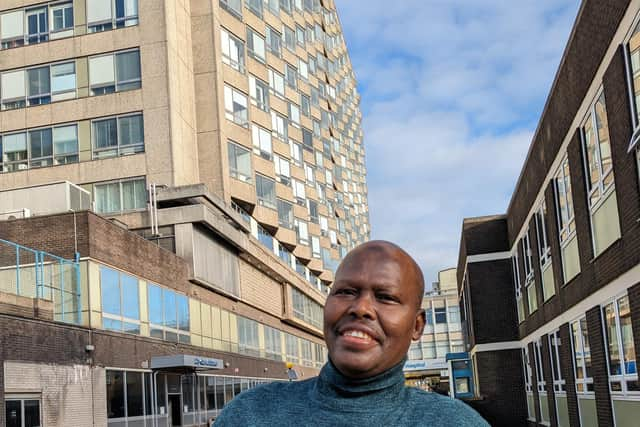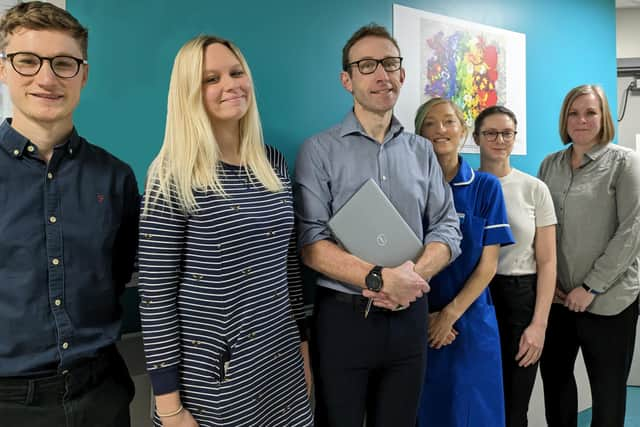Sheffield Teaching Hospitals cancer treatment provides lifeline to patient
Abdi Farah, 49, said he had been given a “lifeline” by Sheffield Teaching Hospitals thanks to the new form of cancer treatment.
Abdi is only the ninth person treated in the South Yorkshire region with the breakthrough treatment, which was his only hope of survival following a devastating diagnosis of aggressive non-Hodgkin lymphoma that could not be kept at bay despite two bouts of gruelling treatments, including a stem cell transplant.
Advertisement
Hide AdAdvertisement
Hide AdNow a recent scan has confirmed that the re-engineered CAR T-cells, which he received last year on September 11, have eradicated all cancer cells from his body.


Sheffield Teaching Hospitals became a designated CAR T-cell therapy centre in November 2022.
CAR T-cell cancer therapy involves reprogramming the patient’s own immune system to attack their cancer. The highly complex treatment, which has shown remarkable results in some patients with blood cancer, is delivered over the course of several steps. The first step involves removing a type of immune system cell, called a T-cell, from the patient’s blood.
Those cells are then sent away to a laboratory where they are given new instructions and made into a CAR T-cell. Once given back to the patient, the re-engineered cells track down and target the cancer cells for destruction. Unlike chemotherapy, this is a “living” therapy, with the goal that the CAR T-cells remain in the body for as long as possible, trying to safeguard against the cancer coming back.
Advertisement
Hide AdAdvertisement
Hide AdNormally fit and healthy, Abdi who works as a clinical support worker in the NHS, started to experience fever and pain in the left side of his tummy while on holiday in December 2022 – but he put the pain down to muscle ache. With all the normal remedies not seeming to have an effect, he visited his GP on his return home, feeling lethargic and struggling to walk.


“I could barely manage the short, two-minute walk from my house to the GP surgery. I didn’t feel normal.”
His GP ordered some investigations, and after finding very abnormal blood results, he underwent further tests and received the devastating news that lymphoma had been found involving his lymph nodes and bone marrow.
Abdi, who has worked in the NHS for 23 years, who said he felt “dreadful” and had to stay in hospital with high fevers, started intensive chemotherapy treatment in January 2023 and also had a stem cell transplant, using his own stem cells last April.
Advertisement
Hide AdAdvertisement
Hide AdThree weeks later Abdi, was able to go home, but a month later, in June, he noticed some lumps on his tummy and leg, with a subsequent PET scan confirming the cancer had returned aggressively.
“The scan was bad news - the cancer had come back. I was told I wouldn’t survive without the CAR T-cell therapy because all other treatments had been exhausted.”
CAR T-cell therapy, which Sheffield Teaching Hospitals had just begun to offer to patients, was the only licensed option in this scenario that offered a realistic chance to cure him, and without it he had just weeks to live.
“The actual infusion of the CAR T-cells is actually less than 30 minutes, but I had to have my white cells taken from my blood first, and then the cells were sent to a European-certified laboratory where they were re-engineered before they were given back to me. It took a few weeks to get everything prepared.
Advertisement
Hide AdAdvertisement
Hide AdOn the 9 October, 10 months after his diagnosis and his rollercoaster journey, Abdi received the news that his cancer was in the “all clear”.
Dr Philippa Kelsey, Consultant Haematologist, Sheffield Teaching Hospitals NHS Foundation Trust, who looked after Abdi said: "CAR-T is an innovative, personalised cancer treatment and a big step forward in treatment for patients with specific blood cancers.
"The evidence for CART-T cells in patients like Abdi, who have no other treatment options, shows that between 50-80% of people will respond to this treatment. Life expectancy without treatment can be a matter of months, with treatment this is expected to be at least one year but with the chance of cure in patients who respond well."
